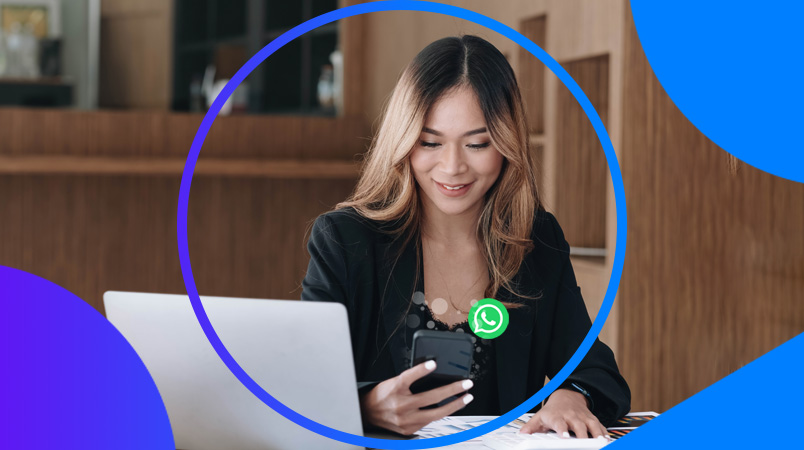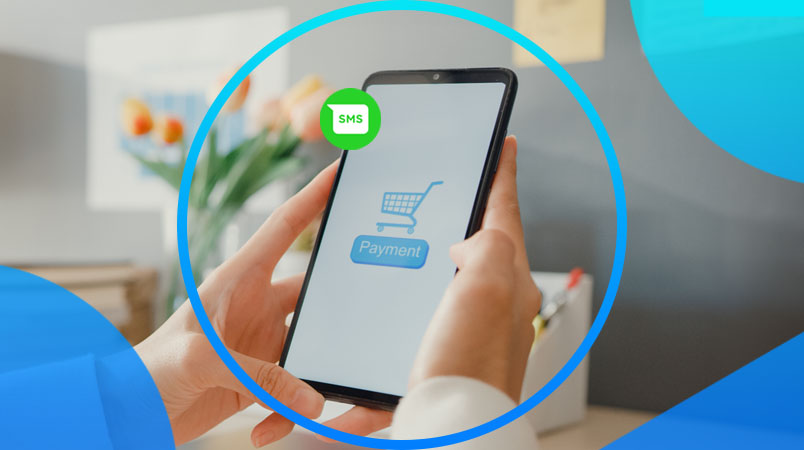WhatsApp Business Platform and Facebook Messenger are both highly populair messaging channels owned by Meta that are available for business communication. A new Meta study shows that 75% of consumers prefer to reach out to a business via messaging apps. So it makes sense that both WhatsApp and Facebook Messenger are at the top of the messaging channel list that companies use to communicate with and engage their audience.
In this blog we'll compare and contract both Meta messaging channels based on their business use: WhatsApp vs Facebook Messenger. Previously, we've published a blog highlighting the differences between WhatsApp and SMS. You can read it below.
WhatsApp Business Platform vs Facebook Messenger: Which Channel is Right for My Business?
There is no easy answer for the question above. We'd love to offer a perfect communication channel for all customer engagement, but there is none. No channel is perfect for every situation, use case, or audience.
It is important to note that WhatsApp and Facebook Messenger both had very different goals and strengths upon creation. The main strength of WhatsApp Business Platform is it's immense reach. For Facebook Messenger, it's mostly been about convenience and features from the start. So Let's take a look at the individual channels first.
WhatsApp Business Platform Overview
WhatsApp is one of the most popular mobile messaging channels. It's available in over 180 countries worldwide and has more than 2 billion daily active users, outranking Facebook Messenger at 930 million global users. WhatsApp can also proudly claim the title of third most popular social network worldwide, following Facebook and YouTube.
WhatsApp Business Platform, the WhatsApp solution for businesses, offers its users cross-platform conversational style two-way messaging services via smartphones. Sending and receiving these WhatsApp messages relies on internet access and the presence of the WhatsApp app on the mobile device. The messaging channel offers rich media services, from voice to video messages, and allows a 4096 character limit per message.
WhatsApp Business Platform is available through API or software, depending on your business needs.
WhatsApp Business Platform Summed Up
Cross-platform two-way messaging service
Conversational User Interface (UI)
Internet access + WhatsApp app required
Global reach (180 countries), over 2 billion active daily users
Available through API and Software
Rich media
4096 character limit
Facebook Messenger Overview
Facebook Messenger also boasts an impressive 2,77 billion mobile phone messaging app users worldwide, and over 7 million businesses already employ Messenger as a customer engagement channel. Monthly, there are more than 20 billion conversations taking place between business and users. Besides personal contact, there are also 300k bots active on Facebook Messenger, exchanging 8 billion automated messages daily.
Facebook Messenger offers two-way conversational style engagement with exciting rich media features. Sending and receiving messages relies on an internet connection and, to an extend, on the Facebook Messenger app. Messenger is in a webbrowser accessible via the Facebook platform, but the UX of Messenger on mobile devices improves with the use of the Messenger app. If users already own the Facebook app, they will be tempted by Meta to also download the Messenger app.
Messenger offers rich media, similar to WhatsApp Business Platform, and the message limit caps at about 20,000 characters. It's available for business use via integrated software or API.
Facebook Messenger Summed Up
Cross-platform two-way messaging service
Conversational UI
Internet access required
On mobile devices, the Messenger app is advised
Over 2 billion Messenger app users
Available through API and Software
Rich media
20,000 character limit
Audience Preferences
The innovative features and statistics mentioned above may seem incredible - and they can be- but only when you can actually employ those features to reach your audience. Both WhatsApp and Facebook Messenger are immensely popular, but there are some key differences between the audiences of both.
WhatsApp Audience: Location and Demographic
Globally speaking, WhatsApp is the most popular messaging channel by far. Not that surprising, considering the 2 billion active daily users worldwide. Especially in Europe, WhatsApp really charmed the crowds - Austria, Germany, Italy, the Netherlands, Spain, and the United Kingdom all rank WhatsApp as their favorite messaging channel! In South-East Asia. WhatsApp is the number one messaging channel in both India and Singapore. In fact, during the second quarter of 2022, India generated almost six million WhatsApp downloads! In East Asia however, WhatsApp has to compete for popularity with other messaging channels. In Japan for example, WhatsApp didn't even make it into the top 5 most popular channels; Line is currently the most popular channel.
But location is not the only determining factor. Different generations prefer different messaging channels. WhatsApp is loved by Boomers (aged 59-75) globally, as it is the messaging channel this generation most frequently uses. Gen X (43 – 58) is also very present on WhatsApp, but WhatsApp has to share the spotlight with Facebook Messenger. Gen Z (11 – 26) and Millennials (27 – 42) also use WhatsApp a lot, but don't consider it their favorite channel.
Facebook Messenger Audience: Age and Location
Facebook Messenger is the king of social messaging channels in the United States, ranking as the number one most popular messaging channel. Even their neighbor Canada agrees: Facebook Messenger is the preferred channel! In fact, North America has the most active Facebook users: 82.3 percent of the population uses this social media platform. In Europe however, Facebook Messenger has a harder time competing for popularity with the other messaging channels. Only in France and Denmark did it manage to grab the 'most popular' title. Generally speaking though, Facebook Messenger still manages to place within the top three for almost all European countries. Facebook Messenger's popularity is lowest in Africa, where only 20.83 percent of the population uses it.
When looking at the age range for the Facebook Messenger audience, we see that Messenger ranks as the most popular messaging channel for Millennials (aged 25 and 44). This is of course the generation that saw the birth and rise of Facebook as a social media platform, so it makes sense that they also willingly adopted its Messenger feature. Gen X (45 – 54) also ranks Facebook Messenger as their favorite channel, but it has to share this spot with WhatsApp.
WhatsApp vs Facebook Messenger: Which Use Cases Are Best Suited for Which Channel?
Customer Support
Both WhatsApp and Facebook Messenger have that informal, conversational nature with added rich media features that makes a channel a great tool for customer support. Customers can engage with your business and ask questions within the familiar interface of the messaging channels they already use, and you can even automate and streamline certain queries and processes with a chatbot on both channels. So which one is better for customer support? The features and rich media are close to identical, so it all depends on your audience.
Marketing & Sales
Sending your customers the latest news, deals and offers via promotional messages can be a huge asset to your marketing efforts and give your sales a boost. WhatsApp Business Platform offers a wide range of marketing and sales enhancing tools - you can send tailored WhatsApp newsletters and personalized promotional messages to (subscribed) customers to offer them your sweet deals. The conversational nature of WhatsApp lends itself perfectly for Conversational Commerce, and even assisted sales. With integrated product catalogs and abandoned cart reminder tools, WhatsApp is perfectly suited to be a marketing and sales powerhouse.
Facebook Messenger also boasts a newsletter or marketing messages feature, and you can also showcase your products within the messaging app. Assisted sales and conversational commerce are also great use cases for Messenger. And as an added bonus, you can also create Facebook Advertisements that click to WhatsApp. This way, you can can boost engagement on both channels.
Notifications & Security
Sending time-sensitive notifications such as tracking and order updates can be done via WhatsApp. The reach of this messaging channel is a great benefit, as it is often crucial that these notifications get seen by the recipients on time. When it comes to security, there is one important use case WhatsApp Business Platform can assist with: Authenticating your customers with One Time Passwords (OTPs). WhatsApp messages, including WhatsApp OTPs, are end-to-end encrypted, making it one of the safest options available.
Facebook Messenger currently doesn't offer any notification tools.
WhatsApp vs Facebook Messenger: The Best Choice for Your Business
We've seen that both Meta messaging channels are very similar in their capabilities. To answer the question above, you will need to ask yourself two questions:
Who do I want to reach?
What do I want to do?
Whether WhatsApp Business Platform or Facebook Messenger is the best choice for your business highly depends on your use case. Do you have a large and engaged audience on Facebook? Is your target audience located in North America? Do you wish to speak to Millennials? Then Facebook Messenger might be your perfect fit. Are you doing business in a region where WhatsApp is king - for example India? Want to send notifications and one time passwords? Then WhatsApp Business Platform is probably a solid choice.
Which messaging channel does your audience prefer? That's the channel where you should be - meet your customers where they are! And you don't even have to choose. Both is also a very viable option. WhatsApp Business Platform and Facebook Messenger can compliment each other greatly. Engage customers with Facebook Messenger and send authentication notifications via WhatsApp Business Platform. Offer assisted sales via WhatsApp and send your promotional content via Facebook Messenger. Everything is possible - it just has to tailor to your audience.
Check out CM.com's WhatsApp Business Platform and Facebook Messenger solutions below, and feel free to reach out to one of our experts to discuss the possibilities for your business.








